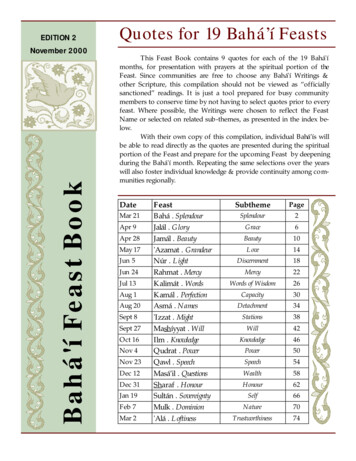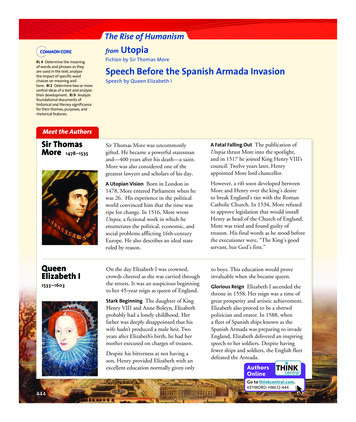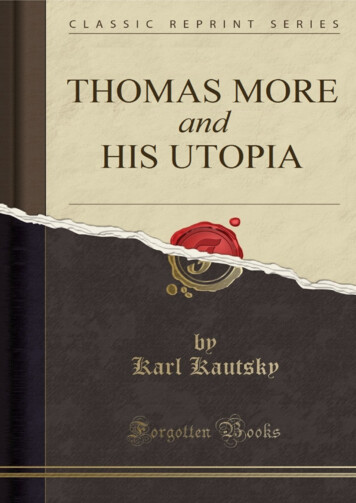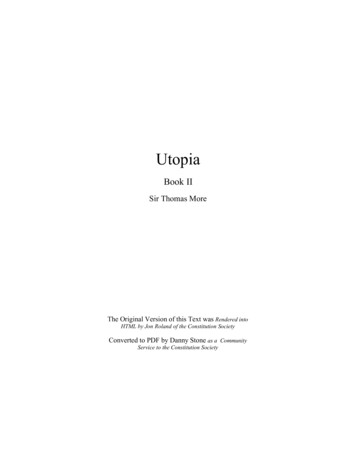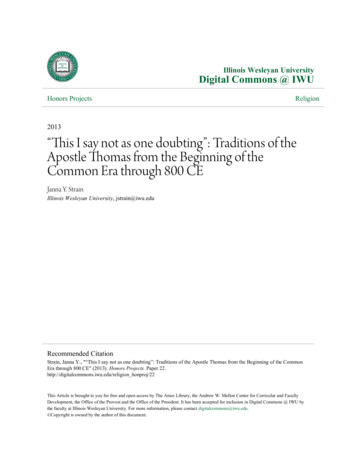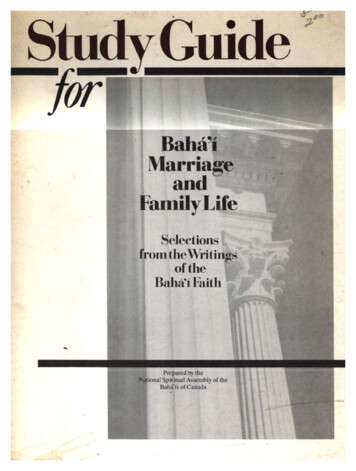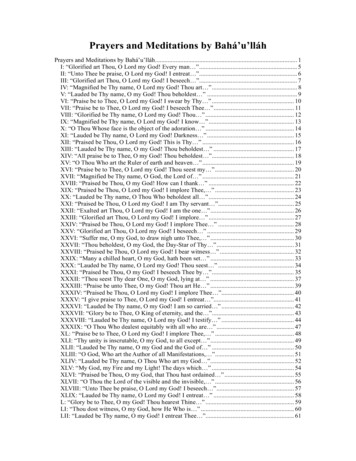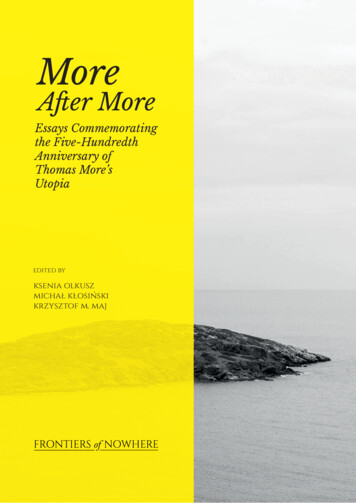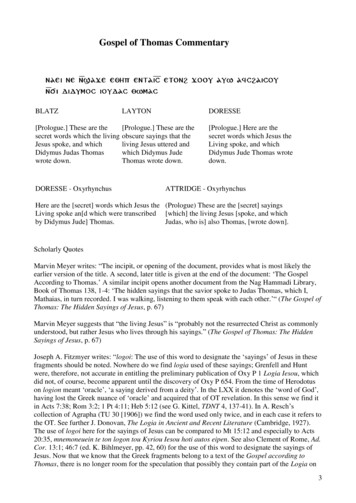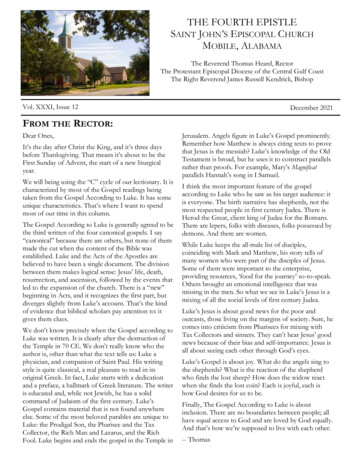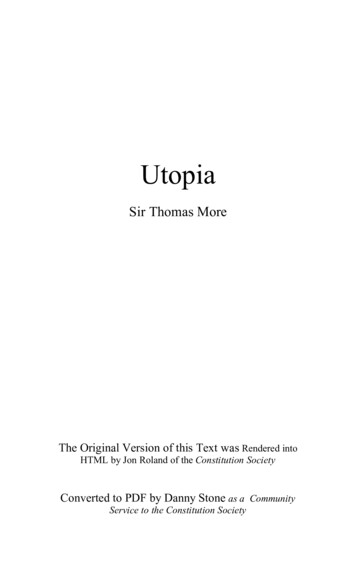
Transcription
UtopiaSir Thomas MoreThe Original Version of this Text was Rendered intoHTML by Jon Roland of the Constitution SocietyConverted to PDF by Danny Stone as a CommunityService to the Constitution Society
Utopia - Book I1Sir Thomas MoreBOOK IHENRY VIII, the unconquered King of England, aprince adorned with all the virtues that become agreat monarch, having some differences of no smallconsequence with Charles, the most serene Prince of Castile,sent me into Flanders, as his ambassador, for treating andcomposing matters between them. I was colleague andcompanion to that incomparable man Cuthbert Tonstal,whom the King with such universal applause lately madeMaster of the Rolls, but of whom I will say nothing; notbecause I fear that the testimony of a friend will be suspected,but rather because his learning and virtues are too great forme to do them justice, and so well known that they need notmy commendations unless I would, according to the proverb,"Show the sun with a lanthorn." Those that were appointedby the Prince to treat with us, met us at Bruges, according toagreement; they were all worthy men. The Margrave ofBruges was their head, and the chief man among them; but hethat was esteemed the wisest, and that spoke for the rest, wasGeorge Temse, the Provost of Casselsee; both art and naturehad concurred to make him eloquent: he was very learned inthe law; and as he had a great capacity, so by a long practicein affairs he was very dexterous at unravelling them.After we had several times met without coming to anagreement, they went to Brussels for some days to know thePrince's pleasure. And since our business would admit it, Iwent to Antwerp. While I was there, among many that visitedme, there was one that was more acceptable to me than anyother, Peter Giles, born at Antwerp, who is a man of greathonor, and of a good rank in his town, though less than hedeserves; for I do not know if there be anywhere to be founda more learned and a better bred young man: for as he is botha very worthy and a very knowing person, so he is so civil toall men, so particularly kind to his friends, and so full ofcandor and affection, that there is not perhaps above one ortwo anywhere to be found that are in all respects so perfect a
Utopia - Book I2Sir Thomas Morefriend. He is extraordinarily modest, there is no artifice inhim; and yet no man has more of a prudent simplicity: hisconversation was so pleasant and so innocently cheerful, thathis company in a great measure lessened any longings to goback to my country, and to my wife and children, which anabsence of four months had quickened very much. One dayas I was returning home from mass at St. Mary's, which is thechief church, and the most frequented of any in Antwerp, Isaw him by accident talking with a stranger, who seemed pastthe flower of his age; his face was tanned, he had a longbeard, and his cloak was hanging carelessly about him, sothat by his looks and habit I concluded he was a seaman.As soon as Peter saw me, he came and saluted me; and as Iwas returning his civility, he took me aside, and pointing tohim with whom he had been discoursing, he said: "Do yousee that man? I was just thinking to bring him to you."I answered, "He should have been very welcome on youraccount.""And on his own too," replied he, "if you knew the man,for there is none alive that can give so copious an account ofunknown nations and countries as he can do; which I knowyou very much desire."Then said I, "I did not guess amiss, for at first sight I tookhim for a seaman.""But you are much mistaken," said he, "for he has notsailed as a seaman, but as a traveller, or rather a philosopher.This Raphael, who from his family carries the name ofHythloday, is not ignorant of the Latin tongue, but iseminently learned in the Greek, having applied himself moreparticularly to that than to the former, because he had givenhimself much to philosophy, in which he knew that theRomans have left us nothing that is valuable, except what isto be found in Seneca and Cicero. He is a Portuguese bybirth, and was so desirous of seeing the world that he dividedhis estate among his brothers, ran the same hazard asAmericus Vespucius, and bore a share in three of his fourvoyages, that are now published; only he did not return withhim in his last, but obtained leave of him almost by force,
Utopia - Book I3Sir Thomas Morethat he might be one of those twentyfour who were left at thefarthest place at which they touched, in their last voyage toNew Castile. The leaving him thus did not a little gratify onethat was more fond of travelling than of returning home to beburied in his own country; for he used often to say that theway to heaven was the same from all places; and he that hadno grave had the heaven still over him. Yet this disposition ofmind had cost him dear, if God had not been very gracious tohim; for after he, with five Castilians, had travelled overmany countries, at last, by strange goodfortune, he got toCeylon, and from thence to Calicut, where he very happilyfound some Portuguese ships, and, beyond all men'sexpectations, returned to his native country."When Peter had said this to me, I thanked him for hiskindness, in intending to give me the acquaintance of a manwhose conversation he knew would be so acceptable; andupon that Raphael and I embraced each other. After thosecivilities were passed which are usual with strangers upontheir first meeting, we all went to my house, and entering intothe garden, sat down on a green bank, and entertained oneanother in discourse. He told us that when Vespucius hadsailed away, he and his companions that stayed behind inNew Castile, by degrees insinuated themselves into theaffections of the people of the country, meeting often withthem, and treating them gently: and at last they not only livedamong them without danger, but conversed familiarly withthem; and got so far into the heart of a prince, whose nameand country I have forgot, that he both furnished themplentifully with all things necessary, and also with theconveniences of travelling; both boats when they went bywater, and wagons when they travelled over land: he sentwith them a very faithful guide, who was to introduce andrecommend them to such other princes as they had a mind tosee: and after many days' journey, they came to towns andcities, and to commonwealths, that were both happilygoverned and well-peopled. Under the equator, and as far onboth sides of it as the sun moves, there lay vast deserts thatwere parched with the perpetual heat of the sun; the soil was
Utopia - Book I4Sir Thomas Morewithered, all things looked dismally, and all places wereeither quite uninhabited, or abounded with wild beasts andserpents, and some few men that were neither less wild norless cruel than the beasts themselves.But as they went farther, a new scene opened, all thingsgrew milder, the air less burning, the soil more verdant, andeven the beasts were less wild: and at last there were nations,towns, and cities, that had not only mutual commerce amongthemselves, and with their neighbors, but traded both by seaand land, to very remote countries. There they found theconveniences of seeing many countries on all hands, for noship went any voyage into which he and his companions werenot very welcome. The first vessels that they saw were flatbottomed, their sails were made of reeds and wicker wovenclose together, only some were of leather; but afterward theyfound ships made with round keels and canvas sails, and inall respects like our ships; and the seamen understood bothastronomy and navigation. He got wonderfully into theirfavor, by showing them the use of the needle, of which tillthen they were utterly ignorant. They sailed before with greatcaution, and only in summer-time, but now they count allseasons alike, trusting wholly to the loadstone, in which theyare perhaps more secure than safe; so that there is reason tofear that this discovery, which was thought would prove somuch to their advantage, may by their imprudence become anoccasion of much mischief to them. But it were too long todwell on all that he told us he had observed in every place, itwould be too great a digression from our present purpose:whatever is necessary to be told, concerning those wise andprudent institutions which he observed among civilizednations, may perhaps be related by us on a more properoccasion. We asked him many questions concerning all thesethings, to which he answered very willingly; only we made noinquiries after monsters, than which nothing is morecommon; for everywhere one may hear of ravenous dogs andwolves, and cruel man-eaters; but it is not so easy to findStates that are well and wisely governed.As he told us of many things that were amiss in those
Utopia - Book I5Sir Thomas Morenewdiscovered countries, so he reckoned up not a few thingsfrom which patterns might be taken for correcting the errorsof these nations among whom we live; of which an accountmay be given, as I have already promised, at some othertime; for at present I intend only to relate those particularsthat he told us of the manners and laws of the Utopians: but Iwill begin with the occasion that led us to speak of thatcommonwealth. After Raphael had discoursed with greatjudgment on the many errors that were both among us andthese nations; had treated of the wise institutions both hereand there, and had spoken as distinctly of the customs andgovernment of every nation through which he had passed, asif he had spent his whole life in it, Peter, being struck withadmiration, said: "I wonder, Raphael, how it comes that youenter into no king's service, for I am sure there are none towhom you would not be very acceptable: for your learningand knowledge both of men and things, are such that youwould not only entertain them very pleasantly, but be of greatuse to them, by the examples you could set before them andthe advices you could give them; and by this means youwould both serve your own interest and be of great use to allyour friends.""As for my friends," answered he, "I need not be muchconcerned, having already done for them all that wasincumbent on me; for when I was not only in good health, butfresh and young, I distributed that among my kindred andfriends which other people do not part with till they are oldand sick, when they then unwillingly give that which they canenjoy no longer themselves. I think my friends ought to restcontented with this, and not to expect that for their sake Ishould enslave myself to any king whatsoever.""Soft and fair," said Peter, "I do not mean that you shouldbe a slave to any king, but only that you should assist them,and be useful to them.""The change of the word," said he, "does not alter thematter.""But term it as you will," replied Peter, "I do not see anyother way in which you can be so useful, both in private to
Utopia - Book I6Sir Thomas Moreyour friends, and to the public, and by which you can makeyour own condition happier.""Happier!" answered Raphael; "is that to be compassed ina way so abhorrent to my genius? Now I live as I will, towhich I believe few courtiers can pretend. And there are somany that court the favor of great men, that there will be nogreat loss if they are not troubled either with me or withothers of my temper."Upon this, said I: "I perceive, Raphael, that you neitherdesire wealth nor greatness; and indeed I value and admiresuch a man much more than I do any of the great men in theworld. Yet I think you would do what would well become sogenerous and philosophical a soul as yours is, if you wouldapply your time and thoughts to public affairs, even thoughyou may happen to find it a little uneasy to yourself: and thisyou can never do with so much advantage, as by being takeninto the counsel of some great prince, and putting him onnoble and worthy actions, which I know you would do if youwere in such a post; for the springs both of good and evilflow from the prince, over a whole nation, as from a lastingfountain. So much learning as you have, even withoutpractice in affairs, or so great a practice as you have had,without any other learning, would render you a very fitcounsellor to any king whatsoever.""You are doubly mistaken," said he, "Mr. More, both inyour opinion of me, and in the judgment you make of things:for as I have not that capacity that you fancy I have, so, if Ihad it, the public would not be one jot the better, when I hadsacrificed my quiet to it. For most princes apply themselvesmore to affairs of war than to the useful arts of peace; and inthese I neither have any knowledge, nor do I much desire it:they are generally more set on acquiring new kingdoms, rightor wrong, than on governing well those they possess. Andamong the ministers of princes, there are none that are not sowise as to need no assistance, or at least that do not thinkthemselves so wise that they imagine they need none; and ifthey court any, it is only those for whom the prince has muchpersonal favor, whom by their fawnings and flatteries they
Utopia - Book I7Sir Thomas Moreendeavor to fix to their own interests: and indeed Nature hasso made us that we all love to be flattered, and to pleaseourselves with our own notions. The old crow loves hisyoung, and the ape her cubs. Now if in such a court, made upof persons who envy all others, and only admire themselves,a person should but propose anything that he had either readin history or observed in his travels, the rest would think thatthe reputation of their wisdom would sink, and that theirinterest would be much depressed, if they could not run itdown: and if all other things failed, then they would fly tothis, that such or such things pleased our ancestors, and itwere well for us if we could but match them. They would setup their rest on such an answer, as a sufficient confutation ofall that could be said, as if it were a great misfortune, that anyshould be found wiser than his ancestors; but though theywillingly let go all the good things that were among those offormer ages, yet if better things are proposed they coverthemselves obstinately with this excuse of reverence to pasttimes. I have met with these proud, morose, and absurdjudgments of things in many places, particularly once inEngland.""Were you ever there?" said I."Yes, I was," answered he, "and stayed some months therenot long after the rebellion in the west was suppressed with agreat slaughter of the poor people that were engaged in it. Iwas then much obliged to that reverend prelate, John Morton,Archbishop of Canterbury, Cardinal, and Chancellor ofEngland: a man," said he, "Peter (for Mr. More knows wellwhat he was), that was not less venerable for his wisdom andvirtues than for the high character he bore. He was of amiddle stature, not broken with age; his looks begotreverence rather than fear; his conversation was easy, butserious and gravehe sometimes took pleasure to try the forceof those that came as suitors to him upon business, byspeaking sharply though decently to them, and by that hediscovered their spirit and presence of mind, with which hewas much delighted, when it did not grow up to impudence,as bearing a great resemblance to his own temper; and he
Utopia - Book I8Sir Thomas Morelooked on such persons as the fittest men for affairs. Hespoke both gracefully and weightily; he was eminently skilledin the law, had a vast understanding and a prodigiousmemory; and those excellent talents with which nature hadfurnished him were improved by study and experience. WhenI was in England the King depended much on his counsels,and the government seemed to be chiefly supported by him;for from his youth he had been all along practised in affairs;and having passed through many traverses of fortune, he hadwith great cost acquired a vast stock of wisdom, which is notsoon lost when it is purchased so dear."One day when I was dining with him there happened to beat table one of the English lawyers, who took occasion to runout in a high commendation of the severe execution of justiceupon thieves, who, as he said, were then hanged so fast thatthere were sometimes twenty on one gibbet; and upon that hesaid he could not wonder enough how it came to pass, thatsince so few escaped, there were yet so many thieves left whowere still robbing in all places. Upon this, I who took theboldness to speak freely before the cardinal, said there wasno reason to wonder at the matter, since this way ofpunishing thieves was neither just in itself nor good for thepublic; for as the severity was too great, so the remedy wasnot effectual; simple theft not being so great a crime that itought to cost a man his life, no punishment how severesoever being able to restrain those from robbing who can findout no other way of livelihood. 'In this,' said I, 'not only youin England, but a great part of the world imitate some illmasters that are readier to chastise their scholars than to teachthem. There are dreadful punishments enacted againstthieves, but it were much better to make such goodprovisions by which every man might be put in a method howto live, and so be preserved from the fatal necessity ofstealing and of dying for it.'"'There has been care enough taken for that,' said he, 'thereare many handicrafts, and there is husbandry, by which theymay make a shift to live unless they have a greater mind tofollow ill courses.'
Utopia - Book I9Sir Thomas More"'That will not serve your turn,' said I, 'for many lose theirlimbs in civil or foreign wars, as lately in the Cornishrebellion, and some time ago in your wars with France, whobeing thus mutilated in the service of their king and country,can no more follow their old trades, and are too old to learnnew ones: but since wars are only accidental things, and haveintervals, let us consider those things that fall out every day.There is a great number of noblemen among you, that arethemselves as idle as drones, that subsist on other men'slabor, on the labor of their tenants, whom, to raise theirrevenues, they pare to the quick. This indeed is the onlyinstance of their frugality, for in all other things they areprodigal, even to the beggaring of themselves: but besidesthis, they carry about with them a great number of idlefellows, who never learned any art by which they may gaintheir living; and these, as soon as either their lord dies or theythemselves fall sick, are turned out of doors; for your lordsare readier to feed idle people than to take care of the sick;and often the heir is not able to keep together so great afamily as his predecessor did. Now when the stomachs ofthose that are thus turned out of doors grow keen, they rob noless keenly; and what else can they do? for when, bywandering about, they have worn out both their health andtheir clothes, and are tattered, and look ghastly, men ofquality will not entertain them, and poor men dare not do it,knowing that one who has been bred up in idleness andpleasure, and who was used to walk about with his sword andbuckler, despising all the neighborhood with an insolentscorn as far below him, is not fit for the spade and mattock:nor will he serve a poor man for so small a hire, and in solow a diet as he can afford to give him.'"To this he answered: 'This sort of men ought to beparticularly cherished, for in them consists the force of thearmies for which we have occasion; since their birth inspiresthem with a nobler sense of honor than is to be found amongtradesmen or ploughmen.'"'You may as well say,' replied I, 'that you must cherishthieves on the account of wars, for you will never want the
Utopia - Book I10Sir Thomas Moreone as long as you have the other; and as robbers provesometimes gallant soldiers, so soldiers often prove braverobbers; so near an alliance there is between those two sortsof life. But this bad custom, so common among you, ofkeeping many servants, is not peculiar to this nation. InFrance there is yet a more pestiferous sort of people, for thewhole country is full of soldiers, still kept up in time ofpeace, if such a state of a nation can be called a peace: andthese are kept in pay upon the same account that you pleadfor those idle retainers about noblemen; this being a maximof those pretended statesmen that it is necessary for thepublic safety to have a good body of veteran soldiers ever inreadiness. They think raw men are not to be depended on,and they sometimes seek occasions for making war, that theymay train up their soldiers in the art of cutting throats; or asSallust observed, for keeping their hands in use, that theymay not grow dull by too long an intermission. But Francehas learned to its cost how dangerous it is to feed such beasts."'The fate of the Romans, Carthaginians, and Syrians, andmany other nations and cities, which were both overturnedand quite ruined by those standing armies, should makeothers wiser: and the folly of this maxim of the Frenchappears plainly even from this, that their trained soldiersoften find your raw men prove too hard for them; of which Iwill not say much, lest you may think I flatter the English.Every day's experience shows that the mechanics in thetowns, or the clowns in the country, are not afraid of fightingwith those idle gentlemen, if they are not disabled by somemisfortune in their body, or dispirited by extreme want, sothat you need not fear that those well-shaped and strong men(for it is only such that noblemen love to keep about them, tillthey spoil them) who now grow feeble with ease, and aresoftened with their effeminate manner of life, would be lessfit for action if they were well bred and well employed. Andit seems very unreasonable that for the prospect of a war,which you need never have but when you please, you shouldmaintain so many idle men, as will always disturb you in timeof peace, which is ever to be more considered than war. But I
Utopia - Book I11Sir Thomas Moredo not think that this necessity of stealing arises only fromhence; there is another cause of it more peculiar to England.'"'What is that?' said the cardinal."'The increase of pasture,' said I, 'by which your sheep,which are naturally mild, and easily kept in order, may besaid now to devour men, and unpeople, not only villages, buttowns; for wherever it is found that the sheep of any soilyield a softer and richer wool than ordinary, there the nobilityand gentry, and even those holy men the abbots, notcontented with the old rents which their farms yielded, northinking it enough that they, living at their ease, do no goodto the public, resolve to do it hurt instead of good. They stopthe course of agriculture, destroying houses and towns,reserving only the churches, and enclose grounds that theymay lodge their sheep in them. As if forests and parks hadswallowed up too little of the land, those worthy countrymenturn the best inhabited places in solitudes, for when aninsatiable wretch, who is a plague to his country, resolves toenclose many thousand acres of ground, the owners as well astenants are turned out of their possessions, by tricks, or bymain force, or being wearied out with ill-usage, they areforced to sell them. By which means those miserable people,both men and women, married and unmarried, old and young,with their poor but numerous families (since country businessrequires many hands), are all forced to change their seats, notknowing whither to go; and they must sell almost for nothingtheir household stuff, which could not bring them muchmoney, even though they might stay for a buyer. When thatlittle money is at an end, for it will be soon spent, what is leftfor them to do, but either to steal and so to be hanged (Godknows how justly), or to go about and beg? And if they dothis, they are put in prison as idle vagabonds; while theywould willingly work, but can find none that will hire them;for there is no more occasion for country labor, to which theyhave been bred, when there is no arable ground left. Oneshepherd can look after a flock which will stock an extent ofground that would require many hands if it were to beploughed and reaped. This likewise in many places raises the
Utopia - Book I12Sir Thomas Moreprice of corn."'The price of wool is also so risen that the poor peoplewho were wont to make cloth are no more able to buy it; andthis likewise makes many of them idle. For since the increaseof pasture, God has punished the avarice of the owners by arot among the sheep, which has destroyed vast numbers ofthem; to us it might have seemed more just had it fell on theowners themselves. But suppose the sheep should increaseever so much, their price is not like to fall; since though theycannot be called a monopoly, because they are not engrossedby one person, yet they are in so few hands, and these are sorich, that as they are not pressed to sell them sooner than theyhave a mind to it, so they never do it till they have raised theprice as high as possible. And on the same account it is, thatthe other kinds of cattle are so dear, because many villagesbeing pulled down, and all country labor being muchneglected, there are none who make it their business to breedthem. The rich do not breed cattle as they do sheep, but buythem lean, and at low prices; and after they have fattenedthem on their grounds sell them again at high rates. And I donot think that all the inconveniences this will produce are yetobserved, for as they sell the cattle dear, so if they areconsumed faster than the breeding countries from which theyare brought can afford them, then the stock must decrease,and this must needs end in great scarcity; and by these meansthis your island, which seemed as to this particular thehappiest in the world, will suffer much by the cursed avariceof a few persons; besides this, the rising of corn makes allpeople lessen their families as much as they can; and whatcan those who are dismissed by them do, but either beg orrob? And to this last, a man of a great mind is much soonerdrawn than to the former."'Luxury likewise breaks in apace upon you, to set forwardyour poverty and misery; there is an excessive vanity inapparel, and great cost in diet; and that not only innoblemen's families, but even among tradesmen, among thefarmers themselves, and among all ranks of persons. Youhave also many infamous houses, and, besides those that are
Utopia - Book I13Sir Thomas Moreknown, the taverns and alehouses are no better; add to these,dice, cards, tables, foot-ball, tennis, and quoits, in whichmoney runs fast away; and those that are initiated into them,must in the conclusion betake themselves to robbing for asupply. Banish these plagues, and give orders that those whohave dispeopled so much soil, may either rebuild the villagesthey have pulled down, or let out their grounds to such as willdo it: restrain those engrossings of the rich, that are as badalmost as monopolies; leave fewer occasions to idleness; letagriculture be set up again, and the manufacture of the woolbe regulated, that so there may be work found for thosecompanies of idle people whom want forces to be thieves, orwho, now being idle vagabonds or useless servants, willcertainly grow thieves at last. If you do not find a remedy tothese evils, it is a vain thing to boast of your severity inpunishing theft, which though it may have the appearance ofjustice, yet in itself is neither just nor convenient. For if yousuffer your people to be ill-educated, and their manners to becorrupted from their infancy, and then punish them for thosecrimes to which their first education disposed them, what elseis to be concluded from this, but that you first make thievesand then punish them?'"While I was talking thus, the counsellor who was presenthad prepared an answer, and had resolved to resume all I hadsaid, according to the formality of a debate, in which thingsare generally repeated more faithfully than they areanswered; as if the chief trial to be made were of men'smemories."'You have talked prettily for a stranger,' said he, 'havingheard of many things among us which you have not been ableto consider well; but I will make the whole matter plain toyou, and will first repeat in order all that you have said, then Iwill show how much your ignorance of our affairs has misledyou, and will in the last place answer all your arguments. Andthat I may begin where I promised, there were four things —'"'Hold your peace,' said the cardinal; 'this will take up toomuch time; therefore we will at present ease you of thetrouble of answering, and reserve it to our next meeting,
Utopia - Book I14Sir Thomas Morewhich shall be to-morrow, if Raphael's affairs and yours canadmit of it. But, Raphael,' said he to me, 'I would gladlyknow upon what reason it is that you think theft ought not tobe punished by death? Would you give way to it? Or do youpropose any other punishment that will be more useful to thepublic? For since death does not restrain theft, if men thoughttheir lives would be safe, what fear or force could restrain illmen? On the contrary, they would look on the mitigation ofthe punishment as an invitation to commit more crimes.'"I answered: 'It seems to me a very unjust thing to takeaway a man's life for a little money; for nothing in the worldcan be of equal value with a man's life: and if it is said that itis not for the money that one suffers, but for his breaking thelaw, I must say extreme justice is an extreme injury; for weought not to approve of these terrible laws that make thesmallest offences capital, nor of that opinion of the Stoicsthat makes all crimes equal, as if there were no difference tobe made between the killing a man and the taking his purse,between which, if we examine things impartially, there is nolikeness nor proportion. God has commanded us not to kill,and shall we kill so easily for a little money? But if one shallsay, that by that law we are only forbid to kill any, exceptwhen the laws of the land allow of it; upon the same grounds,laws may
Utopia - Book I 2 Sir Thomas More friend. He is extraordinarily modest, there is no artifice in him; and yet no man has more of a prudent simplicity: his conversation was so pleasant and so innocently cheerful, that his company in a great measure lessened any longings to go
